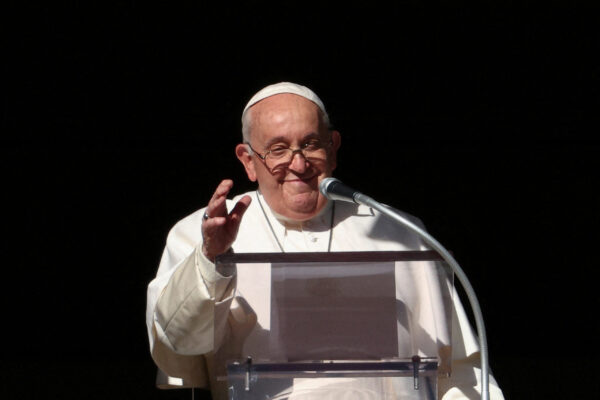Below is the complete catechesis given by Pope Francis at the General Audience of October 30, entitled “Confirmation, the Sacrament of the Holy Spirit”:
Today, we continue our reflection on the Holy Spirit’s presence and action in the Church’s life through the Sacraments.
The sanctifying action of the Holy Spirit reaches us above all through two channels: the Word of God and the Sacraments.
And among all the Sacraments, there is one that is, par excellence, the Sacrament of the Holy Spirit, and it is on this that I would like to dwell today. It is, as you have understood, Chrismation or Confirmation. In the New Testament, in addition to baptism with water, another rite is mentioned, that of the laying on of hands, which has as its objective the visibly and charismatically communicating the Holy Spirit, with effects similar to those produced in the Apostles at Pentecost. —I apologize for reading so badly, but the sun in the eyes is not an easy thing to read—.
The Acts of the Apostles relate a significant episode in this regard. After learning that some in Samaria had accepted the word of God, they sent Peter and John there from Jerusalem. “These men went down,” says the text, “and prayed for them that they might receive the Holy Spirit; for as yet the Spirit had not come upon any of them; they had only been baptized in the name of the Lord Jesus. Then they laid their hands on them, and they received the Holy Spirit” (8:14-17).
To this we must add what St. Paul writes in the Second Letter to the Corinthians: “It is God himself who strengthens us together with you in Christ, and he who anointed us, and who marked us with his seal and gave us the Spirit in our hearts as a guarantee” (1:21-22). The guarantee of the Spirit. The theme of the Holy Spirit as the “royal seal” with which Christ marks his sheep is the basis of the doctrine of the “indelible character” that this rite confers.
Over time, the rite of anointing took shape as a sacrament in its own right, assuming different forms and contents in the various eras and rites of the Church. This is not the place to retrace this complex history. What the sacrament of Confirmation is in the understanding of the Church, it seems to me, is described, simply and clearly, by the Catechism for Adults of the Italian Episcopal Conference. It says: “Confirmation is for each faithful what Pentecost was for the whole Church. […] It reinforces baptismal incorporation into Christ and the Church and consecration to the prophetic, royal and priestly mission. It communicates the abundance of the gifts of the Spirit […].
If, therefore, baptism is the sacrament of birth, confirmation is the sacrament of growth. For this reason it is also the sacrament of witness, because this is closely linked to the maturity of Christian existence. So much for the catechism.
The problem is how to ensure that the sacrament of confirmation is not reduced, in practice, to “extreme unction,” that is, to the sacrament of “leaving” the Church. It is said that it is the sacrament of “farewell,” because once they receive it, young people leave, and will return later for marriage. That is what people say.
We must make it the sacrament of the beginning of an active participation in their life. It is a goal that may seem impossible to us, given the current situation in almost the entire Church, but that does not mean that we should stop pursuing it. It will not be so for all the confirmed, whether children or adults, but it is important that it be so for at least some who will later be the animators of the community.
To this end, it may be helpful to have help in preparing for the Sacrament from lay faithful who have had a personal encounter with Christ and have had a true experience of the Spirit. Some people say that they have experienced this as a blossoming in them of the Sacrament of Confirmation received as children.
But this does not only affect future confirmands; it affects us all and at all times. Together with confirmation and anointing, we have also received, the Apostle assures us, the “pledge of the Spirit” which he elsewhere calls “the first fruits of the Spirit” (Rom 8:23). We must “spend” this pledge, enjoy these first fruits, not bury the charisms and talents we have received underground.
St. Paul exhorted his disciple Timothy to “stir into flame the gift of God received through the laying on of hands” (2 Tim 1:6), and the verb he uses suggests the image of someone who blows on a fire to rekindle its flame. Here is a beautiful goal for the Jubilee Year! To shake off the ashes of habit and disengagement, in order to become, like the torchbearers at the Olympics, bearers of the flame of the Spirit. May the Spirit help us to take some steps in this direction!



